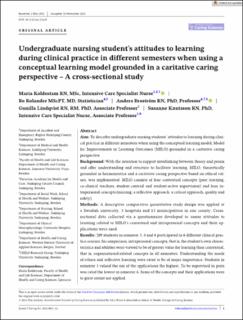| dc.description.abstract | Aim:
To describe undergraduate nursing students' attitudes to learning during clinical practice in different semesters when using the conceptual learning model, Model for Improvements in Learning Outcomes (MILO) grounded in a caritative caring perspective.
Background:
With the intention to support interlinking between theory and praxis and offer understanding and structure to facilitate learning, MILO, theoretically grounded in hermeneutics and a caritative caring perspective based on ethical values, was implemented. MILO consists of four contextual concepts (peer learning, co-clinical teachers, student-centred and student-active supervision) and four intrapersonal concepts (nursing, a reflective approach, a critical approach, quality and safety).
Methods:
A descriptive comparative quantitative study design was applied at a Swedish university, 3 hospitals and 13 municipalities in one county. Cross-sectional data collected via a questionnaire developed to assess attitudes to learning related to MILO's contextual and intrapersonal concepts and their applications were used.
Results:
209 students in semester 3, 4 and 6 participated in 6 different clinical practice courses. In comparison, intrapersonal concepts, that is, the student's own characteristics and abilities were viewed to be of greater value for learning than contextual, that is, organisational-related concepts in all semesters. Understanding the needs of others and reflective learning were rated to be of major importance. Students in semester 3 valued the use of the applications the highest. To be supervised in pairs was rated the lowest in semester 6. Some of the concepts and their applications were to great extent not applied.
Conclusions:
In all semesters, fundamentals in caritative caring and characteristics and abilities related to the individual student were rated to be of greater importance for learning than environmental support. Providing students opportunities to develop independency seems essential. Use of a learning model such as MILO is dependent on a bearing of a caritative caring culture and a shared understanding between all involved in student learning during clinical practice. | en_US |

